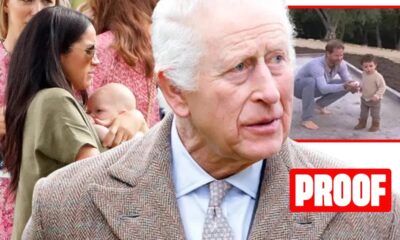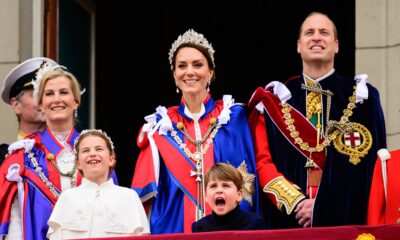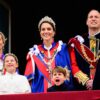Must Read
The Royal Evolution: Archie and Lilibet’s Titles Spark New Conversations
The British monarchy is undergoing a fascinating transformation, particularly evident in the titles of its youngest members.
The recent official recognition of Prince Archie Harrison and Princess Lilibet Diana has reignited discussions about royal traditions, familial connections, and the future trajectory of the Windsor family.
As King Charles III steps into his role, these changes are not just ceremonial; they symbolize a broader evolution within the monarchy.
When King Charles ascended to the throne, significant shifts were initiated within the royal family structure.
The Royal Family's website now proudly displays the titles of Archie and Lilibet, a direct result of a longstanding rule established by King George V in 1917.
This rule stipulates that grandchildren of the monarch are entitled to princely titles, thereby formally recognizing Archie and Lilibet as part of the royal lineage.
Navigating the intricate web of royal titles can be quite perplexing.
The British monarchy operates under a complex system of honors and designations that have evolved over centuries.
The 1917 decree aimed to streamline this system, granting prince and princess titles to the children of the king's sons.
However, the application of these titles often reflects personal choices and modern societal views, making the situation more nuanced than it appears.
Initially, Prince Harry and Meghan Markle expressed a desire for their children to live outside the royal spotlight, opting for privacy over titles.
Their intention was to shield Archie from the burdens of royal life.
However, following the passing of Queen Elizabeth II and the subsequent rise of King Charles, the situation shifted, and Archie and Lilibet received their titles.
This development highlights the ongoing struggle between personal wishes and the obligations of royal protocol.
Public sentiment regarding the titles of Archie and Lilibet is decidedly mixed.
Some view the conferral of these titles as a rightful acknowledgment, while others criticize the Sussexes for seemingly contradicting their previous stance against royal life.
Media coverage has been rife with speculation about the implications for the monarchy and the Sussexes' relationship with the royal family, leaving many to ponder what this means for the institution as a whole.
As we reflect on these changes, it becomes clear that they challenge the monarchy to balance tradition with contemporary values.
The decision to grant titles to Archie and Lilibet raises questions about how the royal family can adapt to a rapidly evolving society while maintaining its historical roots.
This delicate balancing act will undoubtedly shape the monarchy's future and its connection with the public.
The narrative surrounding Archie and Lilibet's titles represents a pivotal moment in royal history.
It underscores the monarchy's efforts to reconcile age-old traditions with modern ideals.
As the royal family continues to evolve, the choices made today will leave a lasting impact on its legacy and its relationship with the British people.
Looking ahead, the implications of Archie and Lilibet's titles extend beyond mere nomenclature.
They serve as a reflection of the monarchy's adaptability in an era where societal expectations are shifting.
The question remains: how will these titles influence the future roles of Archie and Lilibet within the royal framework?
Moreover, the experience of Archie and Lilibet offers insights into broader themes of identity and belonging in our modern world.
Their upbringing in California, combined with their royal heritage, positions them uniquely to navigate the complexities of being part of a historic institution while also embracing contemporary values.
Will they redefine what it means to be royal in today's context?
As conversations about the monarchy's relevance continue, the titles of Archie and Lilibet symbolize a bridge between the past and the future.
They illustrate the ongoing dialogue about what it means to be part of a royal family in a time when inclusivity and representation are paramount.
In essence, the story of Archie and Lilibet is just beginning.
Their titles mark a significant chapter in royal history, one that invites us to contemplate the evolving nature of monarchy in a modern society.
As they grow and navigate their identities, their journey will likely prompt further discussions about the intersection of tradition, modernity, and the very essence of royalty itself.
So, what do you think about this royal evolution?
Are Archie and Lilibet's titles a step forward for the monarchy, or do they complicate the narrative further?
Your thoughts could contribute to this ongoing conversation about the future of the British royal family.






































